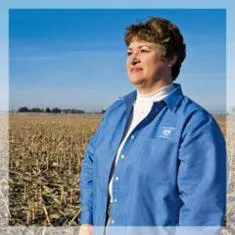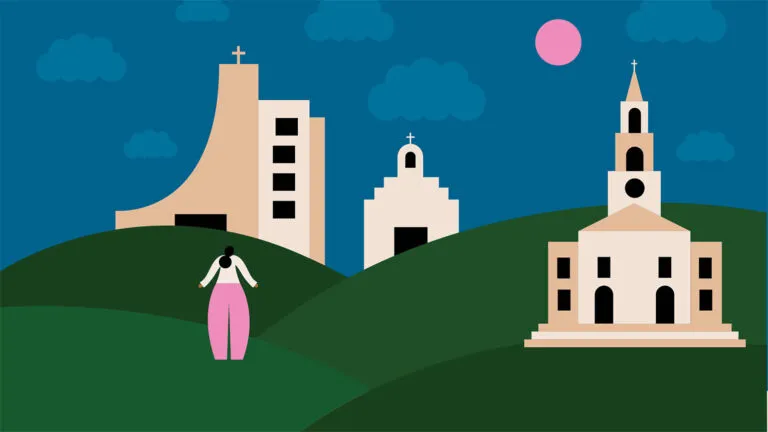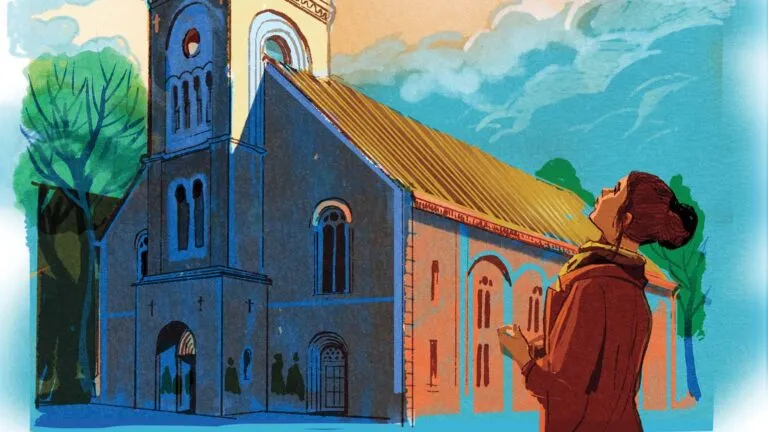Nothing will ever erase the memory of our last Sunday together.
Darrell, my husband, had to get ready for harvest, so my 11-year-old son, Keith, played “Dad” when it was time for church. Keith loved church. So much so that he said he wanted to be a minister when he grew up, though farming was in his blood.
“You look nice,” he told me that morning—just like Darrell would have—when he came into the living room to get his Bible. “And you smell good too!”
In the car he reminded his sisters and me to put on our seat belts. At church he led us to our usual pew. I’d given him some change for the offering, but when the plate came around Keith slipped the coins to his sister Kim, took a dollar out of his own pocket, held it up to his lips and kissed it goodbye.
But some goodbyes are not such fun to remember.
That Tuesday, Keith went to help Darrell as soon as he got home from school. Darrell ran the combine—a huge machine that eats six rows of corn at once, removes the kernels and spits out the cobs and husks. The kernels were put into a gravity-flow wagon next to a corkscrew-looking thing called an auger.
Keith was in charge of the auger. He’d turn it on so the kernels that flowed out of the wagon would travel up the auger screw into the storage bin.
“Keith did good today,” my husband told me that night. “I want to keep him home from school tomorrow to work with me.” I didn’t really like the idea, but I couldn’t say no. Staying home for harvest is a rite of passage on a farm. My son was growing up.
The next morning I kissed Keith goodbye before I left for a computer class. He popped into my mind all day long. I felt uneasy about him working around all that farm equipment. But he’s always careful, I kept telling myself. Stop worrying about him.
Then around three o’clock I got a phone call. It was so strange, as if I’d been expecting it all day: “This is Julie from the clinic. Your son’s been hurt.”
I rushed to the hospital. A chaplain met me in the waiting room. “They’re working on him now,” he said. Darrell showed up minutes later, his face ashen and tear-streaked. Slowly he told me what had happened. He’d driven the combine into the barnyard and didn’t see Keith. The auger was running. Corn trickled through the wagon’s door. Something was blocking the flow. It was Keith.
“I kept grabbing at Keith’s foot,” Darrell said, his voice hollow. “It wouldn’t come out. Finally I turned the wheel on the door to open it wider.” The wagon holds about 14,000 pounds of corn. “It was like a blizzard,” Darrell said. “Keith was down in a fetal position. I pulled and pulled, and finally got him out when the corn poured out the door.” He looked at me for a long moment. “I killed him, Marilyn! He’s dead!”
“No! He’s not! Keith is alive. The chaplain said so!”
He grabbed me by the shoulders. “He had to have suffocated,” he said. “I tried to blow into his mouth; tried to dig the corn out of his throat. I tried.…”
A nurse took us to the ICU. My little boy lay still, hooked up to all kinds of machines, an oxygen mask covering his face. His eyes and lips were puffy. His skin purple. “Keith,” I whispered, “we have to talk to Jesus now.”
As I murmured a prayer, a tear slowly rolled down Keith’s cheek. Darrell stood against the wall, staring into space. “Too young to work alone,” he said. “Should have been in school. Should have done it myself.” A nurse took him to an empty bed where he could collapse.
I kept vigil at Keith’s side. His body trembled. Because of shock, the doctor told me. I held Keith’s hands and leaned over him, offering my prayers as if they were a blanket. Slowly, the trembling subsided. It gave way to stillness. Peace. I looked at the clock. Two-thirty in the morning. The monitors went on beeping, but I knew.
There was a memorial service the next Sunday and a funeral that afternoon. Then, the cemetery. It’s all a blur to me now.
That first year I was too numb to think, too exhausted to sleep. Some days I felt detached from reality. Other days I ached with emptiness. I knew there were supposed to be five stages of grief: denial, anger, bargaining, depression, acceptance. In that order. But not for me. No smooth transition from one stage to the next. My feelings were all over the map.
Darrell buried himself in farm work. The girls, Kim and Kelly, went back to school. At night, Kelly cried. Darrell and Kim didn’t talk about it. The three of them made dinner or did homework. I felt like an observer, not a mother. I watched them get on with their lives. I’d wait all day till nightfall. When it came, I couldn’t think of any reason for having lived through the day. I prayed that God would send Keith back. In my mind I told my son, “You always listened to me. Why won’t you come home now?”
Holidays, of course, were the worst. At Christmastime I went shopping, going through the motions of buying presents. In one store I saw a tree decorated with ornaments, each one with the name and age of a needy child. One of them stood out. A boy, age 11. I took down the ornament and headed to the toy department, where I bought a robot.
When our extended families got together to talk, laugh, eat, tell stories, I observed, as usual. The hollowness inside pushed out, like a balloon being blown up. If only it would burst!
It was a year of firsts—first Thanksgiving, first Christmas, first New Year’s, first Valentine’s Day, first birthday, first Easter. I thought Easter wouldn’t be so bad. We’d been going to church. I was ready for it. So I told myself. I hadn’t really thought about the message of Easter: God gave his only Son to die. I’d lost a son too. Sitting there in the pew that Easter morning, all I could think about was that grin when Keith kissed his dollar goodbye our last Sunday.
Finally a friend convinced me to talk to a professional. “It takes a lot of work to keep everything together,” the counselor told me. “Especially when grief and stress play tricks with your mind.” I knew about those mind tricks. Sometimes I’d end up behind the school bus on my drive to work. I’d look up, expecting to see Keith’s face in the window.
“Sooner or later you’ll start making choices that bring you happiness,” the counselor went on. “I know that right now it’s impossible for you to believe, but things will change. You will find purpose in life again.”
Choices. That was my challenge. I had to choose from what was offered, because I couldn’t choose from what could not be. At first, I chose to think about Keith as I’d known him before he died. Those were happy memories. Keith picking me daisies, teasing his sisters, planting trees with Darrell.
Then it struck me: It wasn’t just Keith in those memories—it was Keith and Darrell and Kim and Kelly. They’d lost him too. They grieved for him in their own ways. I missed Keith. But now I missed the rest of my family. I began choosing to rejoin them, a choice I felt God nudging me toward.
One day Kelly came to me and said, “I need your help, Mom.” She was working on a presentation for school about Keith. About how he’d died. “I need to get some facts about gravity flow wagons.”
No! No! I can’t go back there, I screamed silently. Don’t make me! But it was a choice. A choice to help Kelly. She was being so brave to give this presentation. Somehow the words came out of my mouth: “Yes, I’ll help you.” So we contacted manufacturers. We got a lot of information. One thing shocked me: None of them provided warning labels or safety information about the possibility of suffocation. How could that be?
One night, to help Kelly illustrate the danger for her presentation, Darrell filled a toy wagon with unpopped popcorn, placed a toy person on top and opened the side door. Corn flooded out. It took only seconds for the toy to be buried.
I looked at Darrell, Kim, Kelly. Misery in their eyes. We were missing Keith. But now we were missing him together. By bedtime that night my sorrow had transformed into a mother’s concern. Not for herself, but for those around her. We were all going to get through this together.
But I could never have dreamed how. You see, Kelly’s courageous presentation caused quite a stir. The Future Farmers of America gave her high honors. I got letters from other mothers who had lost children due to farm tragedies. I learned that farming is among the top three most-dangerous jobs listed in this country. Each year more than a hundred children under 19 are killed on farms. Tens of thousands are seriously injured. The biggest culprit is farm machinery. There were so many families out there going through what we’d gone through. They’d written letters and shared their grief.
I made another choice, perhaps the most important one yet. I established Farm Safety 4 Just Kids because it was mostly just kids who were dying due to farm accidents. I did it for Keith. Not just to make sense of his death, but to help others, as he would have wanted.
One night I couldn’t sleep. I went into the living room, picked up Keith’s Bible, sat down and started to read. I came across a passage in James that my little minister-to-be had drawn a box around. “Is there anyone among you who is wise and understanding?” it read. “He is to prove it by his good life, and by his good deed performed with humility and wisdom.”
I wondered if Farm Safety 4 Just Kids was my “good deed,” my purpose, my choice. A choice the Lord had laid before me. I wanted to ask Keith what he thought. Then I realized I didn’t have to; the answer was right there in my hands.





